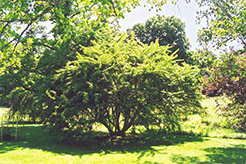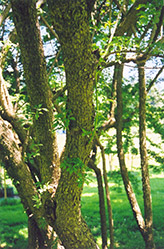Height: 10 feet
Spread: 10 feet
Sunlight:
![]()
![]()
![]()
Hardiness Zone: 4
Other Names: Pricklyspine
Description:
A wide-spreading and multi-stemmed small tree for general landscape use; can get somewhat shrubby, but very adaptable; good for a touch of greenery in heavily polluted or trafficked areas
Ornamental Features
Fiveleaf Aralia has light green deciduous foliage on a plant with an upright spreading habit of growth. The round palmate leaves turn yellow in fall.
Landscape Attributes
Fiveleaf Aralia is a multi-stemmed deciduous shrub with an upright spreading habit of growth. Its average texture blends into the landscape, but can be balanced by one or two finer or coarser trees or shrubs for an effective composition.
This shrub will require occasional maintenance and upkeep, and can be pruned at anytime. Gardeners should be aware of the following characteristic(s) that may warrant special consideration;
- Suckering
- Spiny
Fiveleaf Aralia is recommended for the following landscape applications;
- Mass Planting
- Hedges/Screening
- General Garden Use
Planting & Growing
Fiveleaf Aralia will grow to be about 10 feet tall at maturity, with a spread of 10 feet. It has a low canopy with a typical clearance of 1 foot from the ground, and is suitable for planting under power lines. It grows at a fast rate, and under ideal conditions can be expected to live for approximately 25 years.
This shrub performs well in both full sun and full shade. It is very adaptable to both dry and moist locations, and should do just fine under average home landscape conditions. It is not particular as to soil type or pH, and is able to handle environmental salt. It is highly tolerant of urban pollution and will even thrive in inner city environments. This species is not originally from North America.

